How To Find A Job You Love: 8 Key Strategies
Many strive to find a job they love, but few know how to achieve it. Understanding how to find a job you love involves a combination of self-reflection, skills development, and strategic job searching.
In this article, we’ll guide you through the essential steps to uncovering your passions, enhancing your abilities, and landing a fulfilling career that aligns with your values, interests, and long-term goals.
Find The Job You Love – Why Is It Important?
Choosing the right job is one of the most critical decisions in life. It affects the balance sheet's balance, general welfare, mental welfare and your general career. Reason for choosing the right job:
1. Increased Productivity
You are more engaged and motivated when your work speaks to your passions. This raises standards of effort, creativity, and output.
Dedicated employees volunteer, finish projects faster, and show initiative—all of which help propel corporate success and personal development.
2. Better Mental Health
A fulfilling job reduces stress, anxiety, and emotional exhaustion. Enjoying your work minimizes burnout and fosters self-confidence.
A pleasant workplace improves general well-being, which helps preserve motivation, problem-solving capacity, and growth of critical professional contacts.
3. Career Growth
The correct job offers chances for learning and skill improvement, thus hastening professional progress. Passion for your work encourages continuous improvement, networking, and acquiring new expertise.
Over time, this creates better job prospects, more income, and a more satisfying professional path.
4. Work-Life Balance
A suitable career allows you to balance work and personal life, ensuring job satisfaction, better time management, and reduced stress.
Maintaining this equilibrium enhances overall well-being, strengthens relationships, and increases productivity, leading to a fulfilling and successful professional and personal life.
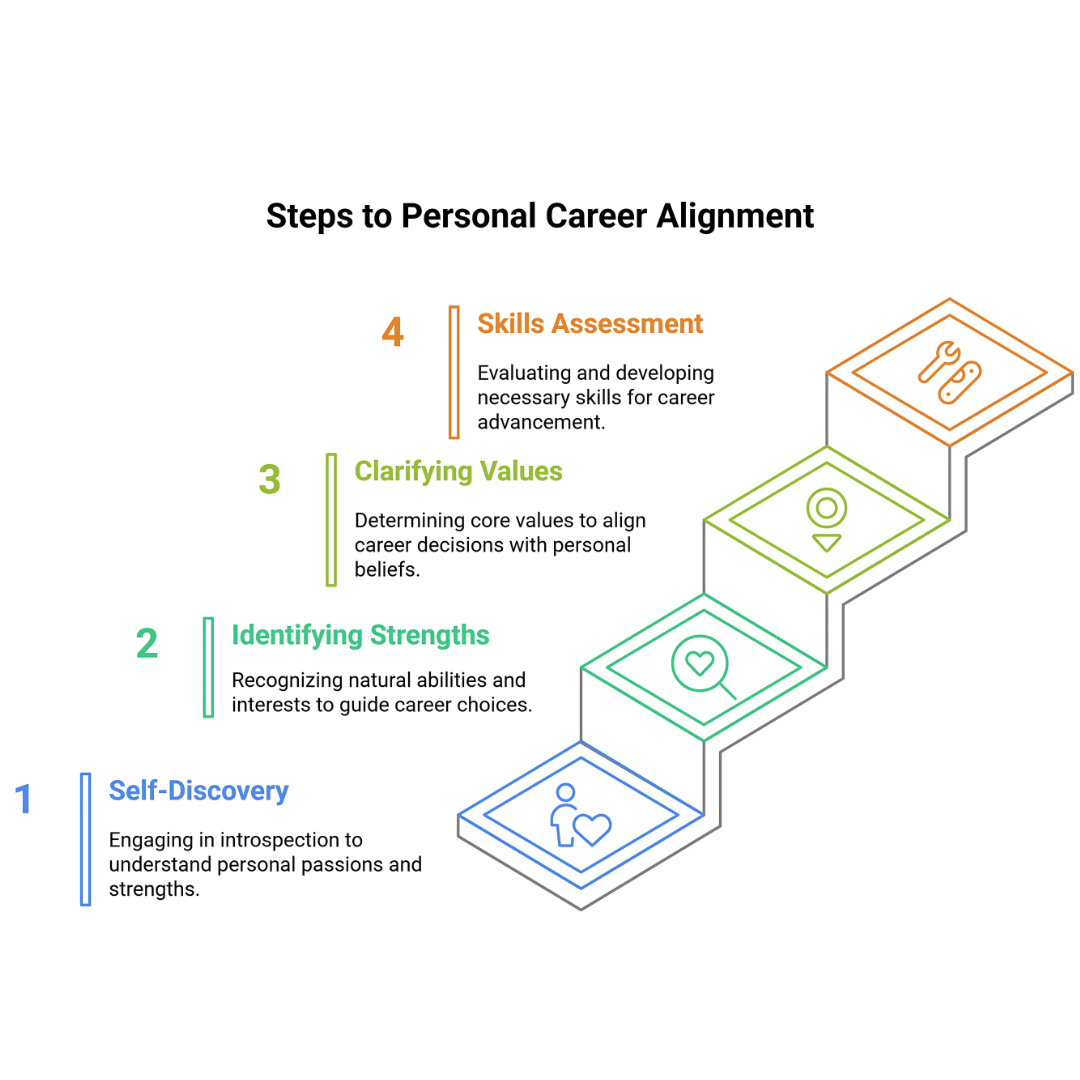
Steps To Finding A Job – Essential Personal Growth Strategies
Finding a job you love starts with individual changes. This process involves self-reflection, skill development, and aligning your career with your values. Understanding yourself better sets the foundation for a fulfilling and successful career.
These are things you can work on personally to prepare for the job you love:
1. Self-Discovery And Reflection
Spending time for self-discovery is crucial even before one enters the employment scene. This stage is realizing what is important to you and how your passions and strengths might guide your career.
Identifying Strengths And Passions
Understanding your natural strengths and passions is key to finding a job that excites you. You will likely remain motivated and involved if your role matches your abilities.
Job seekers can reflect on past experiences or take self-assessment quizzes like the StrengthsFinder or Myers-Briggs Type Indicator (MBTI).
Free resources like 16Personalities or VIA Character Strengths offer insightful tests to help identify core strengths and passions.
Clarifying Values
Knowing your core values is essential when finding a job you love. According to career coaches, understanding what matters most—flexibility, job purpose, or compensation—guides career decisions.
A job seeker should reflect on past experiences to pinpoint what made them happiest in previous roles.
In action, free resources such as values offer exercises to help clarify individual values, making it easier to target the right fit.
Skills Assessment
Identifying the skills you need to develop is key to reaching your desired role. Experts recommend conducting a SWOT analysis to assess your strengths and weaknesses. Job seekers often review job descriptions to identify skill gaps.
Free resources such as Coursera, LinkedIn Learning and EDX provide different free courses that can help you improve these skills and promote the possibility of a complete job mix.
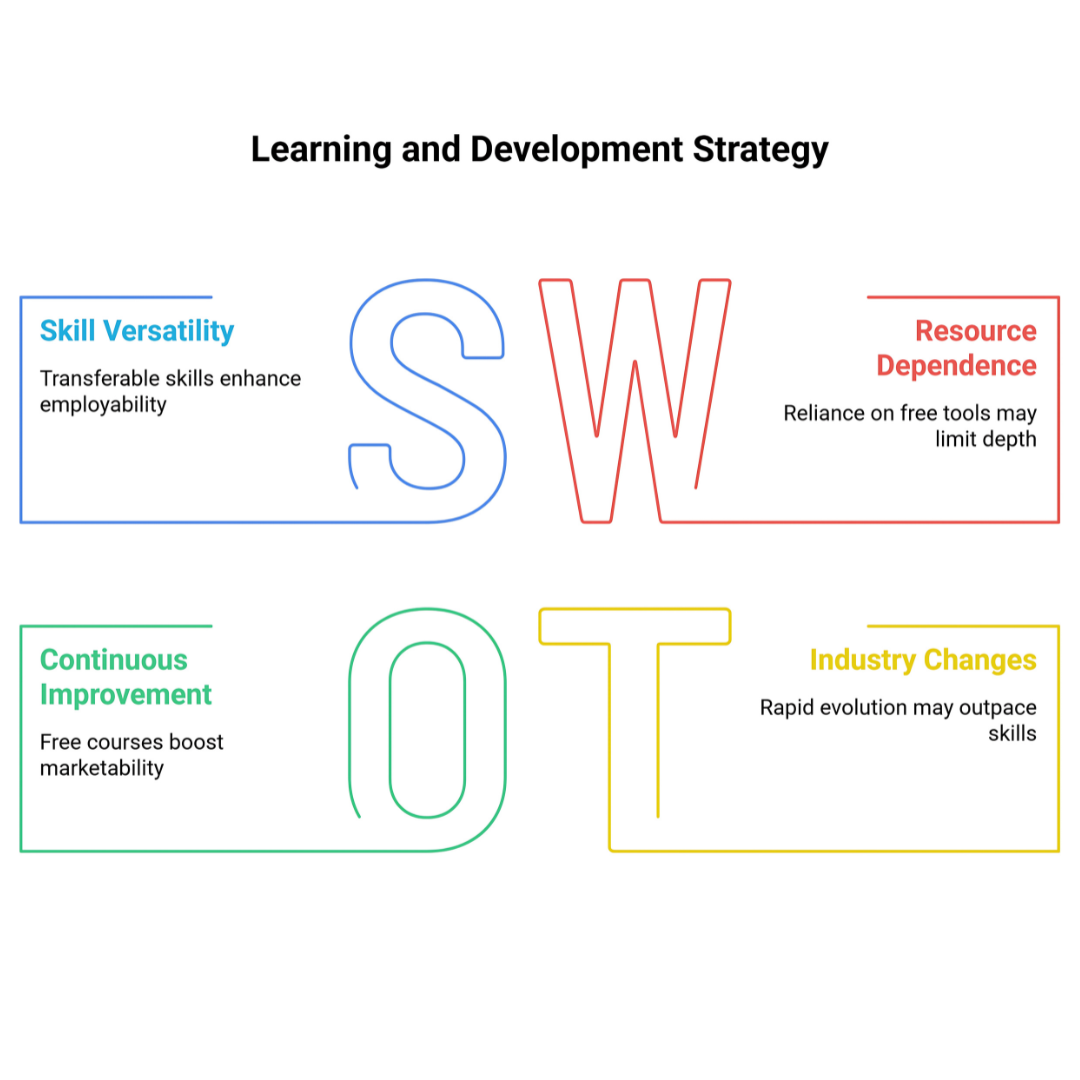
2. Learning And Development Strategy
Career advancement depends on learning and improvement.
Getting the right skills improves your abilities, confidence, and competitiveness in the labour market, which can help you land your dream job.
Skill Building
Focusing on transferable skills like communication, project management, and leadership is essential for finding a job you love.
Specialists have pointed out that these skills are relevant to almost every field, making your versatility all the more valuable. Candidates, in particular, need to focus on acquiring these skills via workshops, volunteering, or online classes.
Free resources like Coursera, LinkedIn Learning, and edX offer courses to enhance these skills, increasing your marketability.
Growth Mindset And Adaptability
Finding a career you enjoy requires a growth attitude. Accepting challenges, learning from mistakes, and being open to fresh ideas will help advance your career.
Experts suggest that job seekers who are adaptable and willing to evolve with industry trends are more successful.
Reflect on yourself, seek mentoring, and attend conferences or webinars to increase your viewpoint and flexibility and help you build this.
Continuous Learning
Continuous learning ensures you stay relevant in a competitive job market. As industries evolve, keeping up with trends and technologies is vital to finding a job you love.
Experts advise reading pertinent blogs or journals regularly, attending industry events, and getting certified.
Using free tools like YouTube lessons, Khan Academy, and Google's Digital Garage, you can keep up with the latest advancements and consistently improve your skill set.
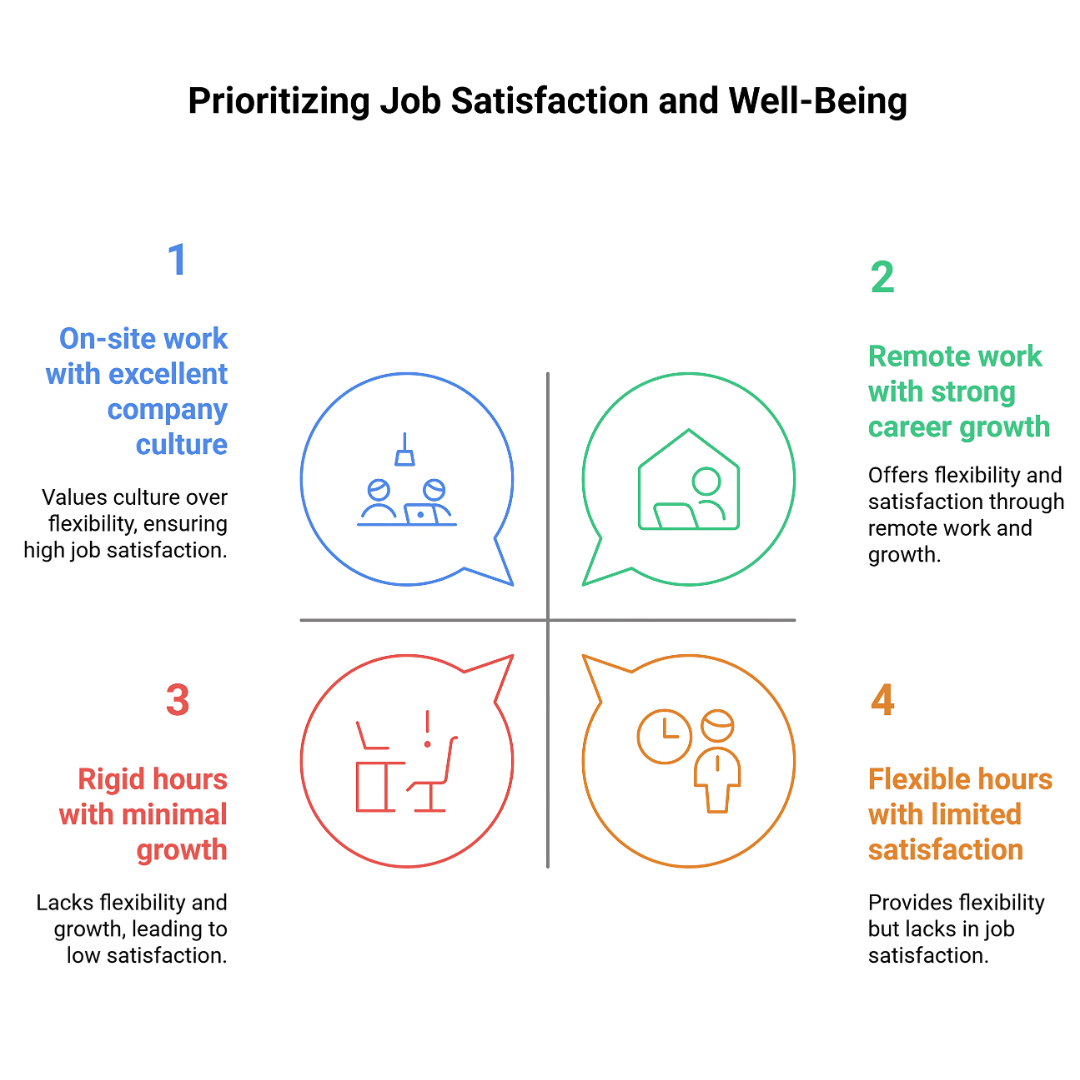
3. Work-Life Balance And Well-Being
While finding the ideal job is crucial, so is ensuring it will match your lifestyle. Check for balance that advances your well-being, mental health, and personal life.
Consider Flexibility
Finding a career you enjoy depends on your flexibility. Whether it's flexible hours or remote work, many job seekers increasingly consider positions that provide a work-life balance as their top consideration.
Experts highlight the importance of identifying what flexibility means to you and actively seeking companies that provide this option. Job seekers should assess their priorities and search for employers aligning with their autonomy needs.
Job Satisfaction Metrics
Salary is just one piece of the puzzle when considering how to find a job you love. Reflect on company culture, job stability, career growth, and personal fulfillment.
Experts suggest evaluating a company’s values, work environment, and growth opportunities before accepting an offer.
Job seekers may use sites like Glassdoor or Indeed to evaluate work satisfaction levels and ensure the position fits their career path.
Mental Health Awareness
A job you love should support your mental and emotional health. Prioritize well-being by setting boundaries between work and personal life.
Experts recommend mindfulness, regular exercise, and time management techniques to avoid burnout. Job seekers should look for organizations that offer mental health resources and encourage work-life balance.
Mindfulness techniques are available through resources like Calm or Headspace to help you stay focused and manage stress.
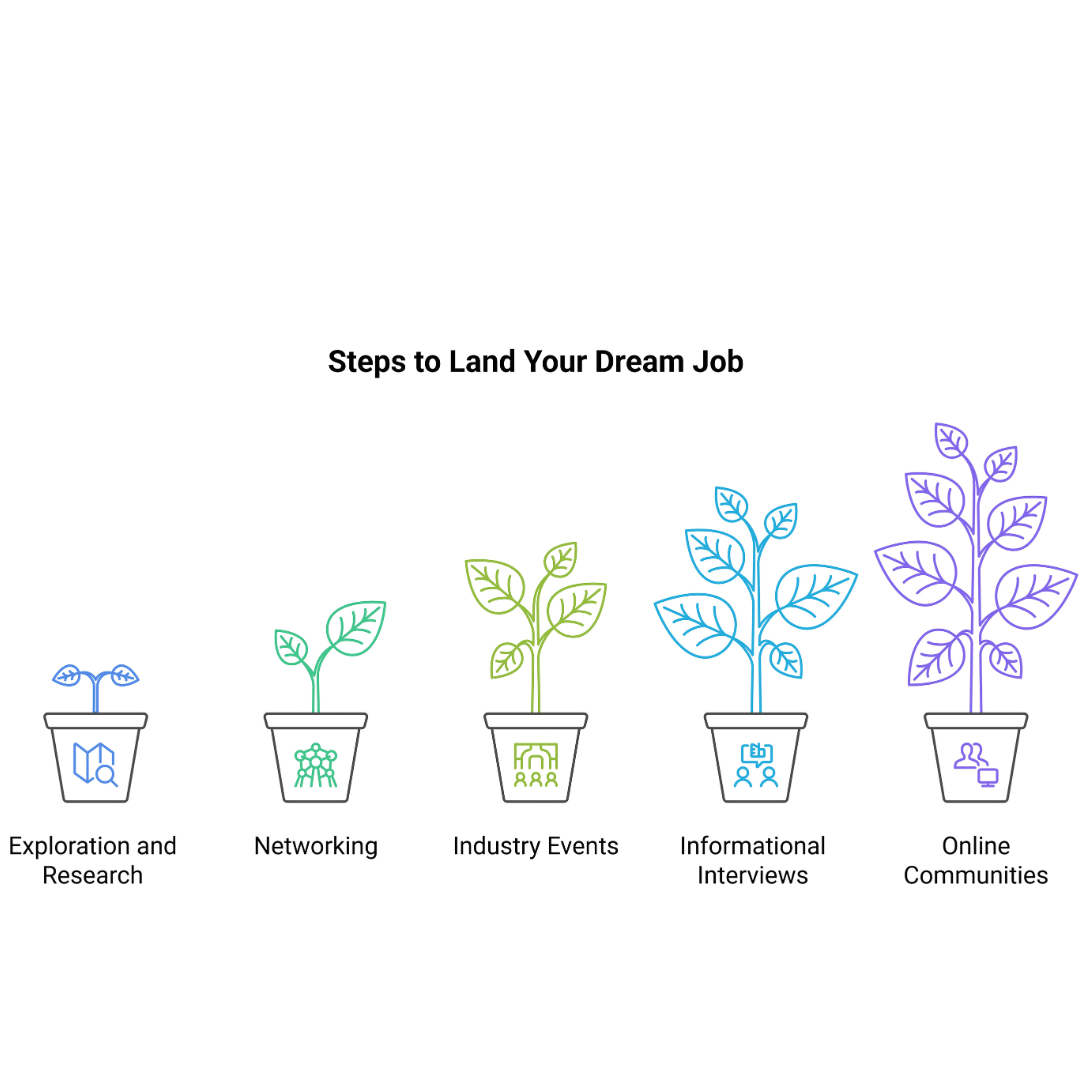
The Best Way To Find A Job – 5 Key Steps To Follow
Finding a job requires a structured approach. By taking practical steps – such as research, networking and sewing CV – you can increase the possibility of playing a role that matches your goals
You can take the following practical steps to land a job you love:
1. Exploration And Research
Once you get to know yourself better, it's time to investigate sectors and jobs that might suit you. Many people believe their sole job fits them, when in reality, there are many opportunities.
Industry Research
Researching sectors that fit your interests and talents is essential to discovering a job you love. Career professionals advise focusing on fast-growing industries such as technology, healthcare, and renewable energy.
Job seekers can use free resources such as LinkedIn, Glassdoor, and industry-specific blogs to stay up to date on trends.
This research helps identify sectors that offer long-term job satisfaction and align with your skills and interests for a fulfilling career path.
Job Role Exploration
Exploring job roles is vital to understanding how to find a job you love.
To find chances which appeal to you, experts suggest closely reading descriptions of jobs on websites like LinkedIn and Indeed. Look for positions that align with your skills and passions.
This exploration allows job seekers to discover tasks and responsibilities that genuinely interest them, helping to choose a job that offers both engagement and personal fulfillment in the long run.
Growth Opportunities
Look for work you enjoy by noting sectors with steady career expansion. Professionals advise concentrating on fields with excellent employment prospects, such as artificial intelligence, healthcare, and renewable energy.
Job seekers should use resources like the Bureau of Labour Statistics and LinkedIn to research industry growth projections.
Targeting fields with outstanding career potential guarantees a consistent, fulfilling path for future professional development and job satisfaction.
2. Networking
Networking enhances the job search process. Speaking with people already in your goal sector will help you understand the nature of the work, the difficulties, and how best to present yourself for success.
Industry Events
Attending industry events is crucial for finding a job you love. You can network with specialists in the field and discover new trends by attending conferences, webinars, and community events. These are great opportunities to network with potential employers and learn more about your field.
Experts recommend participating in these events to expand your network and discover new opportunities. Platforms like Eventbrite and Meetup offer free access to industry-specific events.
Informational Interviews
Informational interviews offer insightful information about professions you could be drawn to. Contacting experts in positions you respect will help you better understand the career and field.
Experts recommend using LinkedIn to initiate these conversations and better understand job responsibilities and growth potential.
These interviews help you align your aspirations with industry expectations, guiding your decisions and providing a firsthand understanding of the function.
Online Communities
Engaging in online communities is a great way to find a job you love. Platforms like LinkedIn, Reddit, and Discord allow you to connect with people in your desired industry.
Participation in these communities allows one to share, seek advice, and learn from the experiences of others.
They say that an active presence in these communities helps to widen your network, keep track of hot developments in the sector, and find several unadvertised positions.
Wealthy Affiliate – Mini Review (2025)
If you’ve ever thought about turning your blog, passion, or niche into an online business,
Wealthy Affiliate (WA) is one of the most beginner-friendly platforms I’ve used.
It combines step-by-step training, website hosting, SEO research tools,
and an active community all in one place.
What I like most: you can start free (no credit card needed),
explore lessons, test the tools, and connect with other entrepreneurs
before upgrading. WA isn’t a “get rich quick” scheme — it’s a platform where success comes
from consistent effort and applying what you learn.
3. Experimentation And Experience
Sometimes, the best way to know if you’ll love a job is to try it out. Gaining firsthand experience through part-time roles, freelancing, or internships can help you determine whether a job is a good fit without making a full commitment.
Freelance Or Part-Time Work
Freelancing or taking on part-time roles can help you to find a job you love. These changes allow you to work on real-world projects, test your enthusiasm, and learn about other sectors.
Experts recommend using platforms like Upwork or Fiverr to find freelance gigs that align with your interests. This allows you to gauge whether a full-time role in the same field would be a good fit.
Internships Or Volunteer Work
Internships and volunteer work provide hands-on experience in your desired field. Working in a real-world setting gives you insight into job responsibilities, industry expectations, and workplace culture.
Experts suggest internships as a great way to test the waters and build essential experience.
You can locate opportunities that fit your career aspirations with websites like VolunteerMatch and Internships.com. They also allow you to learn more about your chosen field and gain valuable connections.
Side Projects
Starting side projects is an effective way to build a portfolio that aligns with your desired career path. Experts recommend pursuing personal projects that match your interests, even outside your primary job.
These initiatives allow you to develop skills, showcase your creativity, and demonstrate your passion to potential employers.
Platforms like GitHub for developers or Behance for creatives are great for showcasing your work, expanding your professional network, and gaining practical experience.
4. Job Search Strategy
Once the foundation is set, it's time to aggressively hunt for employment that fits your beliefs, interests, and degree of expertise. Using a methodical approach can help you improve your chances of finding a job you enjoy.
Personal Branding
Developing a strong brand is crucial to landing a fulfilling career. Professionals advise building a personal website, a LinkedIn professional profile, and a portfolio to highlight your work, achievements, and expertise.
A well-curated personal brand helps you stand out to recruiters and employers by presenting a cohesive, authentic narrative about your expertise and values.
These platforms increase your visibility, making it easier for potential employers to connect with you and reach out to you.
Targeted Job Search
One of the best ways to land a job you enjoy is a focused job hunt. Professionals advise against applying for positions outside your interests, values, and long-term objectives.
While persistence is important, focusing on fit positions saves time and energy.
Job seekers should prioritize quality over quantity and tailor their applications to meet the company's specific needs for a better match.
Tailored Resumes And Cover Letters
Tailoring your resume and cover letter is crucial when finding a job you love. Experts recommend tailoring these documents to emphasize key skills and experience that match the job description.
This shows employers you’re serious about the role and helps your application stand out. Emphasizing your strengths and how you meet the job’s requirements increases your chances of landing the job.
5. Growth Mindset And Adaptability
Success in the workplace depends on an attitude toward growth and adaptation. Accepting change, being adaptable, and always learning will help you negotiate obstacles and advance toward your long-term career objectives.
Stay Open To Change
It is crucial to stay open to change to find a job you love. Job applicants should be prepared to learn new skills and adjust to different responsibilities as needed.
Experts suggest maintaining a growth mindset as industries evolve and new opportunities emerge. Platforms like Coursera and LinkedIn Learning offer free courses to help you gain skills and stay competitive. This ensures you're prepared for future growth.
Long-Term Vision
A long-term vision is essential when finding a job you love. Experts recommend regularly evaluating where you want to be in 5–10 years and assessing whether your current job aligns with your life goals.
Job seekers should reflect on their values and ambitions, using resources like career assessments or coaching to ensure their career path is aligned with their desired future.
Embrace Feedback And Improvement
Getting a career you enjoy requires accepting criticism. Experts advise aggressively seeking helpful criticism from managers, mentors, or peers to advance your abilities.
Job applicants should be receptive to criticism and take concrete measures to develop their skills.
Free tools like mentoring initiatives or meetup groups give opportunities to engage with seasoned professionals who can help you professionally develop and provide incredible value.
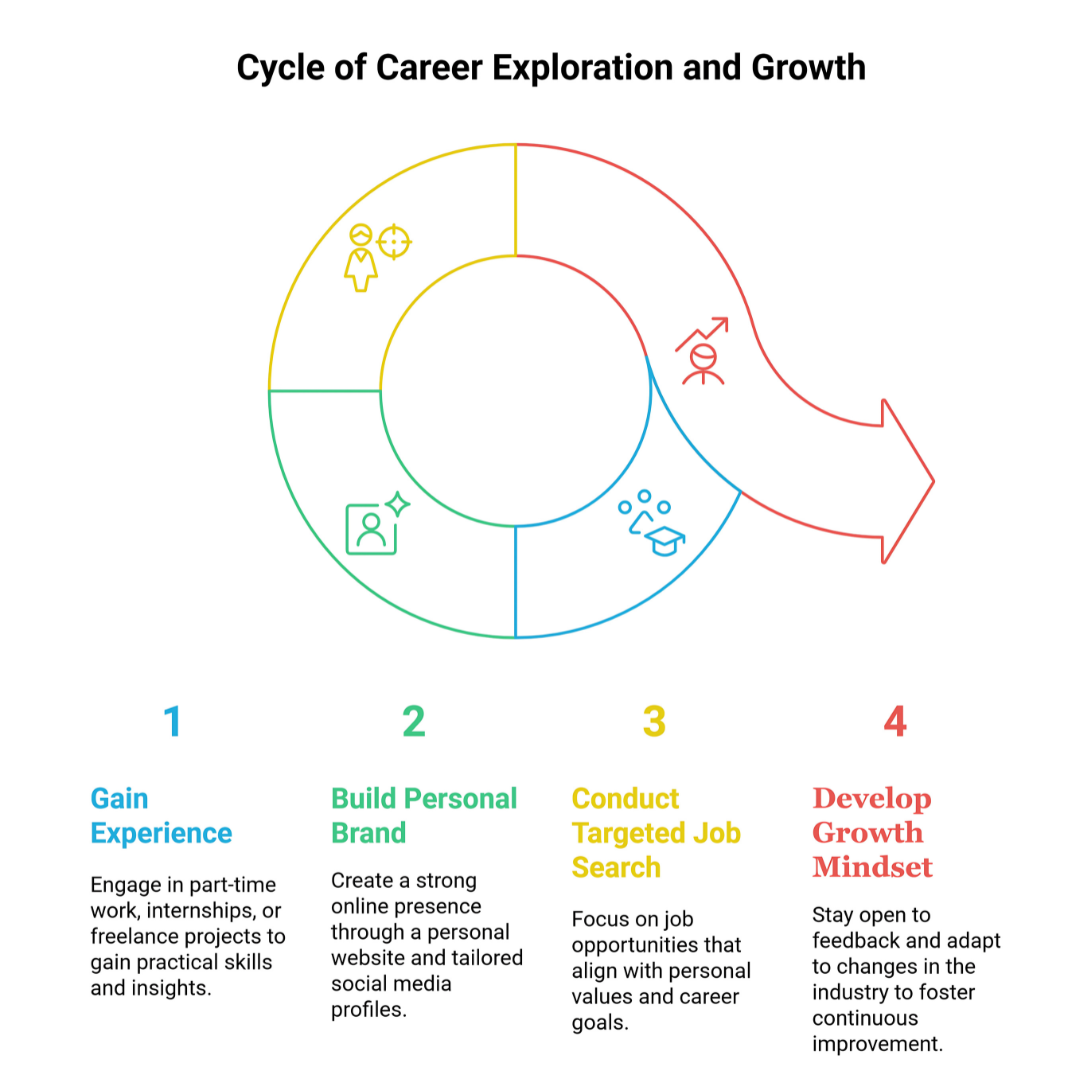
Conclusion
Finding a career you enjoy is a lifelong process that calls for perseverance and introspection. Knowing your ideals, strengths, and interests will help you spot the appropriate opportunities.
Keep active, try new things, network, and upskill. The employment market is ever-changing; your ideal career could change.
By taking a systematic approach to the process of finding a job you love, you will find a rewarding career that fits your objectives and provides you with long-lasting happiness.
I trust you enjoyed this article on the How To Find A Job You Love: 8 Key Strategies. Please stay tuned for more insightful blogs on affiliate marketing, online business, and working from anywhere in the world.
Take care!
— JeannetteZ 🌍✨
💬 Your Opinion Is Important To Me
Do you have thoughts, ideas, or questions? I’d love to hear from you. Please leave your comments below or email me directly at Jeannette@WorkFromAnywhereInTheWorld.com.
📚 More Work From Anywhere Reads
🚀 Ready to Build a Business You Can Run from Home
Or from Anywhere in the World?
Imagine creating income on your terms — from home, a cozy café, or wherever life takes you.
With the right tools, training, and community support, it’s entirely possible.
Start your own online business for free — no credit card needed.
Disclosure
This post may contain affiliate links. As an Amazon Associate and participant in other affiliate programs, I earn from qualifying purchases at no extra cost to you. Please read my full affiliate disclosure.






